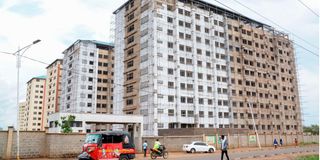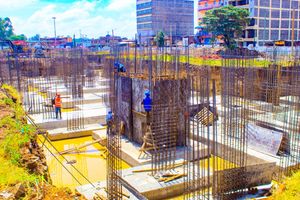
Upcoming Makasembo Estate in Kisumu City under Affordable Housing Project on March 20, 2025.
President William Ruto’s housing dream was meant to be a lifeline – a chance to give dignity to ordinary Kenyans while creating jobs.
For some, however, it has been a nightmare. Instead of hope, it has brought heartbreaks. Instead of opportunity, it has sown uncertainty. And instead of housing dignity, it has delivered evictions, lawsuits and social dislocation.
For those referred to as “affordable housing refugees,” the displacement and delayed or broken promises have shattered lives.
In Nairobi, residents of Lang’ata, Huruma and Marigoini estates have been evicted or are living in fear of losing their homes. While some support the programme, many say they were not consulted.
In Lang’ata, a court temporarily froze a 17-storey project after a petition presented by Busia senator Okiya Omtatah and others.

Houses in the affordable housing programme being constructed at Bondeni Estate in Nakuru Town East.
“No studies have been conducted to establish the impact the 17-storey blocks, and the high population the project will generate will have on strategic national facilities such as the Nairobi National Park, Lang’ata Barracks and Wilson Airport,” the petition said.
In Huruma, Muslim leaders protested the “grabbing” of the community’s prayer and learning grounds.
North Rift: They told us to move and forgot us
The rumble of bulldozers hit Pioneer estate in Eldoret like a warning. Soon, the houses built by the defunct Eldoret Municipal Council were flattened, making way for the 1,500-unit housing project. More than 800 families were ordered out. Some were given notices. Though Sh10,000 was promised to every household, many say they never saw a cent.
“Most remain homeless and there is little hope of benefiting from the affordable houses due to financial constraints,” said Mr Lucas Obiero, an evictee.
Families in Kapsuswa faced a similar fate. Eviction letters were given and houses came down, to be replaced by highrise buildings.
“This is to notify you that Kidiwa 2 project will soon kick off. As per the lease agreement, you are given three months to vacate the houses with effect from January 13, 2025 to pave the way for the Kidiwa 2 Affordable Housing project,” read a notice signed by Mr Julius Koech, Chief Officer Housing and Urban Development.
The projects are nearly complete but those who once lived there are in temporary shelters, unsure of returning.

An affordable housing project in Ngara, Nairobi, on December 4, 2020.
The pain takes a different form in West Pokot County. Here, the government says it is repossessing public land from illegal occupants. Some residents of Bendera in Kapenguria say the land is ancestral.
“The government took the title deed and the devolved government later set up an open air market, rendering us landless,” said Mr Harun Chumba, grandson of Lokwang Poson Pkieng, now deceased.
Kapenguria MCA Richard Mastaluk added: “There are alternative sites the houses can be constructed without displacing families.”
A project launched by President Ruto in Trans Nzoia on January 16, 2024, has stalled. What was to be a 2,000-unit mini-city is now a dumpsite.
The President presided over the launch of 320 affordable housing units in Kericho in March 2024. However, the project sits on land claimed by the Talai clan. Though the Environment and Land Court lifted an order halting the development, the community insists its rights have been violated.
Mr David Kiprono Lang’at and Mr Ng’eno Kenet told the court that the Talai have been on the land for six decades. The Sh283.4 million project is to be completed in 2026. For many in Kericho, the cement hasn’t just buried soil, it has buried history, too.
Nyanza, Western: We got Sh96, 000
Kisumu’s Makasembo estate had almost 100 families. When the affordable housing plan took root, the tenants were given notices. Every family received a one-time payout of Sh96, 000.
“I’ve lived in Makasembo for 30 years. Where do I go with Sh96,000? We used to pay Sh7,000 for a one-bedroom house but after my husband died, I had to move to a bedsitter,” said Ms Jane Akinyi, a widow.
The mother of three is not sure of being prioritised for the affordable housing.
The 1,800-unit project is supported by Lapfund. Several former tenants went to court, accusing authorities evicting them without providing resettlement options.
In Kakamega, bulldozers descended on Milimani estate, tearing down houses of high-profile individuals like Mr Jaswant Singh Rai and former Cabinet Secretary Amina Mohamed. Police used teargas to disperse looters.
Mr Ahmed Maluma, a resident, said: “Police and the government should have provided security. It is disheartening to see people carting away fridges and other property.”
Isaac Too, a guard, attempted in vain to stop the looting.
“We did all we could but the looters had the advantage of numbers. These people acquired their properties properly but their houses are now being demolished. It is not fair,” Mr Too said.
Even government employees were not spared in Siaya. Mr Vincent Otieno, a public health officer, said he and his colleagues were given a two-month notice to vacate the houses.
Mt Kenya: Churches torn down
The government targets 2,000 units in the first phase of the affordable housing rollout in Murang’a County. The cost is already being felt – deeply. At least two churches were demolished in Kandara.
The impact? Some 700 faithful now go to the bush for worship. Only after an uproar did Governor Irungu Kang’ata provide an alternative site. Traders and transporters in Murang’a town fear the government plans to take over the matatu terminus.
“We have been told to prepare for the project that will see all activities at the main terminal shifted near Murang’a-Sagana road,” said Ms Susan Mbatia, a hawker.
Ithanga Kakuzi Human Rights Advocacy Coordinator Romano Nyambura said more than 800 people could be evicted from the area.
In Kenol, a standoff has stalled the construction of 300 units. Kirinyaga devolved government workers were thrown out of government houses without notice.
“The houses were demolished to pave the way for the project. Our families are suffering,” said one employee, who did not wish to be identified.
“Some of us sought shelter in town while others went to their rural homes and have to commute to work daily.”
Mombasa: We have moved to Airbnbs
One place that captures the betrayal is Buxton estate in Mombasa. More than 500 tenants were evicted to make way for the now completed Buxton Point Affordable Housing Project. The residents were promised tenant-purchase terms and signed agreements. Every family paid Sh60,000 as deposit.
Mr John Tsuma, their secretary-general, says they signed an agreement to be allowed to buy the houses.

Houses in the affordable housing programme being constructed at Bondeni Estate in Nakuru Town East.
“Initially, we were told we would pay gradually after occupying the houses. The agreement was altered even before construction started. The new model required us to pay Sh3 million off-plan, meaning Sh250,000 every month for a year,” Mr Tsuma said.
“That is unrealistic. This is public land and public money, but only 10 per cent of the profits go to the county while the developer takes the rest.”
Some 184 tenants were to benefit in phase one but none has received a house.
“We were told that 40 former tenants had already bought units, but we have not seen their names. What we see are empty houses with curtains. Some are being turned into Airbnbs. This was not the plan. It has become a business for the few,” Mr Tsuma lamented.
He has petitioned the Senate Committee on Roads and Housing, and reached out to Lands Cabinet Secretary Alice Wahome.
The displaced residents now live in Mishomoroni, Bamburi and Miritini – paying double the rent they once did.
“We used to pay Sh3,800 for a three-bedroom house in Buxton. Now, we are paying more than Sh7,000 for a one-bedroom in a far-flung area. Transport is a struggle. Some of the tenants have even moved to their rural areas,” he added.
Even as affordable housing projects roll out in Likoni, Changamwe, Khadija and Tudor, many fear a repeat of Buxton.
Nominated Senator Miraj Abdillahi, who has been engaging key stakeholders, said projects like Buxton Point “are raising red flags”.
“If due process is not followed, Kenyans will reject future developments,” the senator said.
From the hills of Iten to the shores of the Indian Ocean, the stories are hauntingly similar. People are evicted, projects delayed and promises broken. The affordable housing was meant to be a dream but for many, it has become an open wound.
Reported by Kevin Cheruiyot, Daniel Ogetta, Mwangi Muiruri, George Munene, Vitalis Kimutai, Kassim Adinasi, Rushdie Oudia, George Odiwuor, Domnic Ombok, Wycliffe Nyaberi, William Maina, Barnabas Bii, Oscar Kakai, Evans Jaola and Mishi Gongo.







